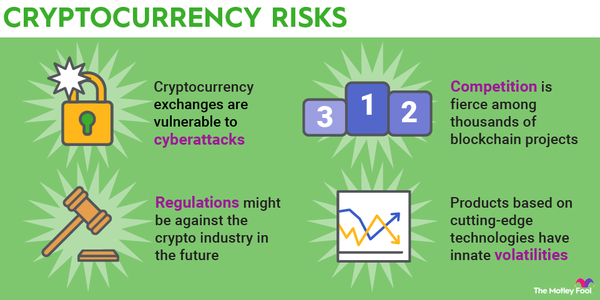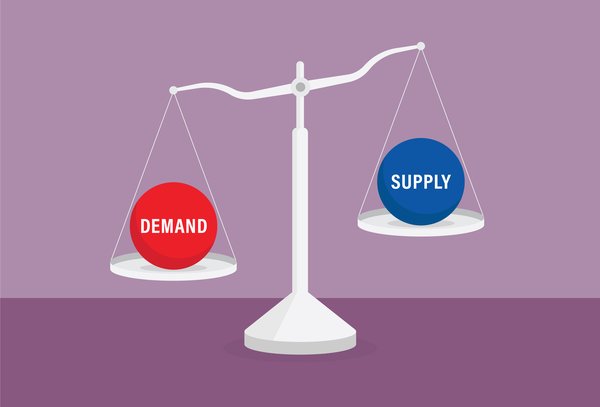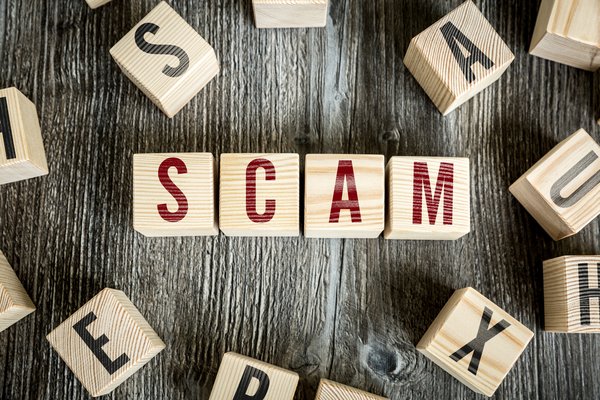An estimated 46 million Americans own at least a small fraction of a Bitcoin (BTC -0.97%) these days. An average of about 1.4 million Bitcoin tokens change hands every day. At the same time, many prospective crypto buyers have not pulled the trigger on purchasing it because they don’t understand digital currencies.
The risks of trading cryptocurrencies are considerable, and you need to think them over before taking the plunge. So let’s take a look at the dangers and challenges investors face in the cryptocurrency market.

What is cryptocurrency?
What is cryptocurrency?
A cryptocurrency is a digital asset connected to a blockchain network, which keeps track of holdings and transactions behind several layers of cybersecurity. Some cryptocurrencies are designed to act as digital currencies and long-term stores of value. Others offer additional features such as smart contracts and decentralized computing platforms, which facilitate advanced products such as non-fungible tokens (NFTs) and decentralized finance apps.
Bitcoin is the leading name in the value-store category. For smart contracts, most users and developers rely on Ethereum (ETH -0.05%). The two are the most substantial cryptocurrency networks today. Thousands of smaller and newer cryptocurrencies exist, and even the largest names in this ever-expanding group are known as altcoins.
Risks
Understanding risks of trading cryptocurrencies
Cryptocurrencies can be exciting. This sector is always on the move, and it is not unusual to see the latest market darling skyrocketing to fantastic short-term gains.
However, cryptocurrencies are also fraught with risk. At a bare minimum, you should consider the following risks and threats of cryptocurrencies before you invest in this thrilling but dangerous sector.
1. Volatility
Soaring crypto prices can turn into a nosedive the next day. This is not the place to be if you aren’t comfortable with market risks. Prices will rise and fall, just like in the stock market, but the swings tend to be sharper among digital assets.
2. Unclear valuation
Investors in the stock market have the benefit of business operations with concrete financial results. Stock prices can be based on the underlying company’s sales, earnings, growth rates, cash flows, dividend yields, and many other factors.
That’s not the case in the crypto market. Some digital coins have real-world use cases as the basis for next-generation financial services, but the long-term prospects are hazy even then. In many cases, crypto investors don’t have a financial framework suitable for a proper market-value analysis.
Crypto critics like to compare these assets to the tulip bulb mania or the dot-com bubble -- it can be hard to find any sustainable value in a heap of computer-generated data.
3. Hacking risks
To mess up the transaction ledger of a blockchain, a hacker generally must control more than half of the network’s validation nodes. Once a cryptocurrency grows large enough to pop up on your investing radar, it’s probably safe from these brute-force hacks.
However, the cryptocurrency exchange where you make your crypto trades and store your digital holdings may be targeted by other cybersecurity threats. That’s usually the story when you see headlines about “crypto hacks.”
So it’s important to use crypto-trading services with hacker-proof security. Larger names such as Coinbase (CRYPTO:COIN), Binance, and Kraken are always under attack but rarely breached, so that’s a good place to start. On top of that, you should enable the toughest login security your chosen service has available.
4. Lacking regulations
Governments and regulatory bodies around the world are still figuring out how to manage cryptocurrencies. Some, such as El Salvador and the Central African Republic, are going all-in by adopting Bitcoin as an official currency. In India and China, on the other hand, officials have declared cryptocurrencies illegal. Most markets land somewhere between the extremes, and the U.S. government is currently grappling with the issue of cryptocurrency regulation.
Should these digital coins be treated as a dollar-like currency or more like a financial asset? This classification will inform the rules for holding, trading, creating, and charging taxes on cryptocurrencies, and there are no easy choices here. A one-size-fits-all solution could be a mistake since different cryptocurrencies have different goals and features, and they might need a variety of regulatory treatments on a case-by-case basis.
Until the murky regulatory waters clear up, many investors will continue to shy away from this messy situation. That’s particularly true for institutional investors and other well-heeled sources of capital.
5. Decentralization
Many investors and crypto enthusiasts see decentralization as an important feature of digital assets. Cutting out middlemen such as banks and financial service providers from the equation reduces transaction fees and speeds processing times. Data validation across a global network adds to the security of blockchain systems.
But decentralization can be a double-edged sword. Truly decentralized blockchain networks are managed by consensus and votes among a global community, which raises a number of potential problems. Proposed changes to a particular blockchain’s technology may not be popular, delaying or even blocking helpful or outright necessary tweaks. Groups with malicious intent could infiltrate communities and take control over time. The voting systems themselves might be imperfect, allowing a different kind of hacker attack that targets the blockchain’s steering community.
6. Lost crypto wallet keys
Cryptocurrency holdings are held in a digital wallet. You can use the wallet services of your preferred trading platform, you can set up a digital wallet on your smartphone, and you might even purchase a special gadget that does nothing but store cryptocurrency keys.
What happens if you forget the password to your digital wallet? Even worse, what if you lose the smartphone or hardware wallet that held your Bitcoin and Ethereum assets?
Getting your digital money back can be difficult or even impossible. Computers won’t go out of their way to help you recover a lost fortune; a human banker might.
Who should invest
Who should invest in cryptocurrencies?
Cryptocurrencies could be a great investment -- for some people. You have to accept every risk listed above, be prepared to find additional spots of trouble over time, and generally be ready to stay informed. The more you know about how blockchain networks and digital currencies actually work, the more likely you are to find long-term winners in this chaotic sector. There’s work to be done, both before you get started and along the way.
In the end, cryptocurrencies are not every investor’s cup of tea. Any of the risks above could be deal breakers for you -- and that is perfectly fine.
You don’t need to stress out over risk-laden cryptocurrencies. There are many other ways to get used to the ins-and-outs of building wealth for the long term. The stock market gives you lots of options, for example. Many companies have direct ties to the crypto sector, which lets you benefit from the digital assets through the lens of a fully regulated trading system. That’s one way to dip your toes in the crypto market without actually buying any cryptocurrencies.
Related investing topics
Holding cryptocurrency for the long term
If you still want to put some money directly into the cryptocurrency market after all of these warnings, that’s also fine. Here at The Motley Fool, we recommend that you take a long-term view of whatever market you have chosen to invest in because that’s the best way to increase wealth in the long run.
Keep an eye on the news to keep up to speed. Just don’t overreact to the daily headlines. You don’t need to “hodl” your cryptocurrencies forever, but the wild short-term swings tend to cancel each other out over time. As long as you pick names with solid long-term prospects, the temporary chart squiggles won’t matter. It’s all about pocketing compound returns over many years, just like in the stock market.













































